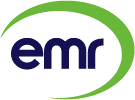Knowledge and quality are crucial at EMR
The customer
European Metal Recycling (EMR) is a global market leader in metal recycling. With 3.500 employees in over 150 locations around the world, EMR produces an impressive 10 million tonnes of recycled raw materials each year. Innovation and integrity are the core strength of their market position. That has a direct impact on quality management in this quickly changing field, both in processes and for people and resources. In the Netherlands, EMR has five locations with a total of approximately 90 employees. Quality, Health & Safety and Environmental Coordinator Arno Kempers explains what the Kiwa certification means to EMR.

The activities
Arno Kempers: “Our core business is recycling scrap metal from vehicles and consumer products, industrial and construction waste and building demolition. We collect scrap metal, process it into raw materials according to the specified standards, and then sell it to smelters who then use it to make new products. This involves a lot of knowledge and process management because we are active in a chain where quality must be guaranteed. When the scrap arrives, it is sorted by metal type, from lead to irons, copper, aluminium, etc. It is then checked for impurities, and we ensure it is purified before going any further. Any items that are too large are reduced to a maximum of one metre using a scrap cutter. And finally, everything is placed in containers to be transported to the smelters who can empty them directly into their furnaces.”
Importance of certification
“There is an enormous amount of regulation concerning the processing of scrap for construction and consumer products, which encompasses permits, processes and installations. Not to mention that employees also need to be able to work safely and stay healthy for the duration. Certification is important for us to be able to guarantee quality to our customers, but it is also essential internally for improving our processes. We operate in a continuous cycle of planning, doing, checking and acting – the Deming PDCA circle. To me, certification is primarily an instrument for documenting and improving the business”, says Arno Kempers.
Why Kiwa
EMR works with Kiwa as an independent certifier for both ISO 9001 and ISO 14001, as well as MRF. The ability to have one organisation perform all these certifications was a deciding factor. As Arno explains, “We wanted to be able to do multiple certifications at once because it makes the audit process much more efficient. There is no need to explain everything over and over because the certifier understands our organisation and our processes.” The main advantage of working with Kiwa is, according to Arno, their knowledge and integrity. “It is easy to communicate with one another because the auditors know how things work here, but without sacrificing any of their objectivity. It’s important that they remain meticulous, because to act otherwise would undermine the value of the certification. I can spar with them about how to interpret standards and regulations, which can sometimes be so complex and bureaucratic that they only make sense when you work through them together.”
Document and improve
“There is no real education or training in our industry, so the more you can document reliably, the more internal training you can provide. The annual certification process provides us with a guide for processes, standards and structure. That is invaluable because we work with approximately 90 employees across five different locations. Each location also has a very different culture, but they all must comply with the same certification requirements. The auditors do a great job of bridging the different cultures, by the way. Oversight, streamlining and improvement are a never-ending challenge. Certification by Kiwa helps us enormously in that regard,” says Arno Kempers, Quality, Health & Safety and Environmental Coordinator for EMR.


